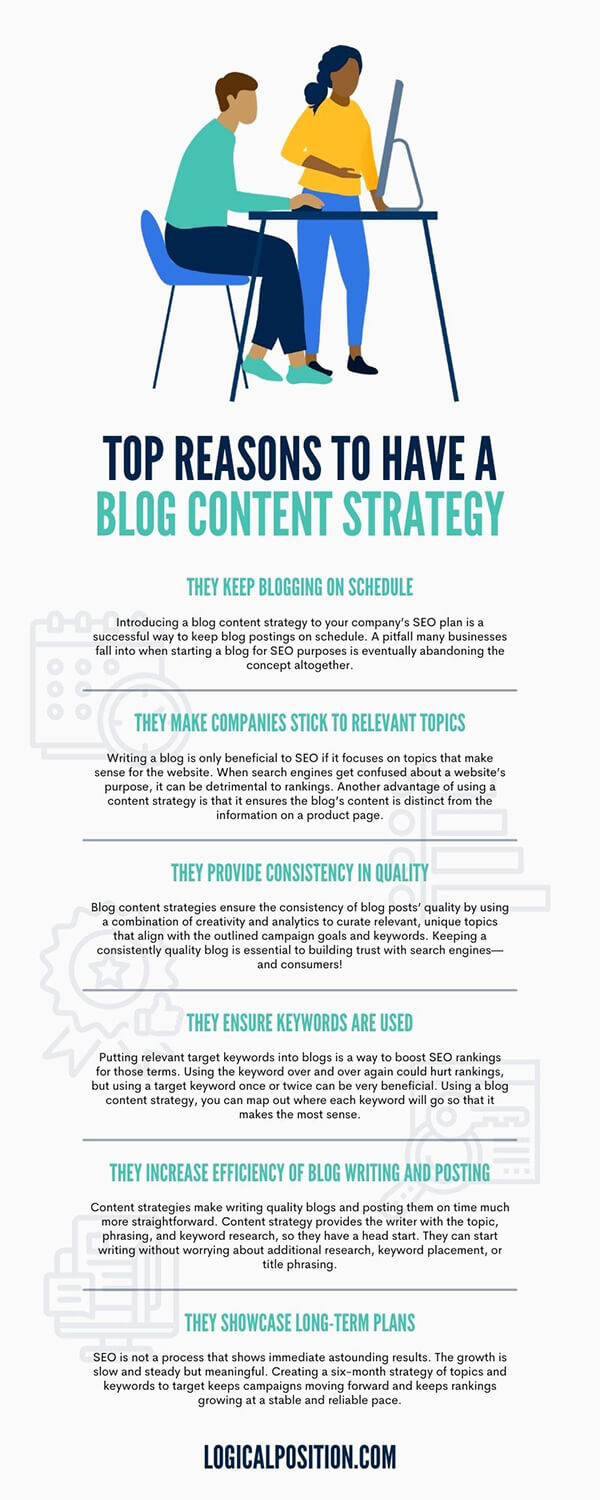Search engine optimization, or SEO, is a form of digital marketing that improves a website’s organic rankings on search engines such as Google. SEO is essential for businesses, which need online visibility to succeed as more consumers turn to the digital sphere for their product and service needs.
Blogging is vital to maintaining fresh, new content that’s pertinent to the site and relevant to what the site users are interested in or need to know. Sites need updated content to show that they’re active, relevant, and focused on providing a positive user experience. Search engines are looking to rank user-focused sites that provide positive information to the users.
However, much more than just quality content determines a site’s organic rankings for specific keywords. Incorporating these keywords and posting relevant content is a great way to start growing a site’s rankings.
When handling their own SEO services, businesses often run into many issues that can slow and even damage their websites’ organic search ranking growth due to improper blogging techniques. Blog content strategies minimize these issues and keep companies on track. Discover the top reasons to have a blog content strategy below.
They Keep Blogging on Schedule
Introducing a blog content strategy to your company’s SEO plan is a successful way to keep blog postings on schedule. A pitfall many businesses fall into when starting a blog for SEO purposes is eventually abandoning the concept altogether. Running a company is hard work, and blogging can easily get pushed to the bottom of a priorities list. Posting relevant content one time and then abandoning the blog can make the entire site look abandoned. If Google or another search engine determines that a website is old or abandoned, the site will likely decrease in its rankings for specific keywords in favor of sites with newer content. Therefore, keeping up with a blog is vital to the continued growth and relevance of a site’s rankings, and a blog content strategy keeps websites on schedule.
They Make Companies Stick to Relevant Topics
Creating a content strategy ensures a website’s blog includes only topics that are relevant to the site. Writing a blog is only beneficial to SEO if it focuses on topics that make sense for the website. For example, an e-commerce company that sells blankets, throw pillows, and other cozy home items should write blogs such as “A Guide to Incorporating Throw Pillows into a Living Room” and “How To Choose a Pop of Color for Your Bedroom.” These are relevant topics that help people looking to purchase throw pillows, blankets, and other home items. If that same website wrote a blog called “Reasons Baseball Is the Best Sport,” search engines may become confused. When search engines get confused about a website’s purpose, it can be detrimental to rankings.
Another advantage of using a content strategy is that it ensures the blog’s content is distinct from the information on a product page. Many companies make the mistake of writing exclusively about their products or service offerings, which often leads to duplicate and unoriginal content. Duplicate content is something search engines look for when considering SEO rankings, and it can lower a site’s ranking for specific keywords. Content strategies cut down on duplicate content by outlining relevant yet diverse topics for the site.
They Provide Consistency in Quality
Creativity is fluid. Some days, creativity is flowing, and unique, relevant topics that align expertly with a company’s campaign goals keep coming. Other days, when creativity hits a roadblock, fewer topics may fit with the overarching campaign goals. Blog content strategies ensure the consistency of blog posts’ quality by using a combination of creativity and analytics to curate relevant, unique topics that align with the outlined campaign goals and keywords.
Keeping a consistently quality blog is essential to building trust with search engines—and consumers! Search engines want the best user experience possible, and people want consistent quality they can rely on. User experience and search engine rankings go hand in hand.
They Ensure Keywords Are Used
Putting relevant target keywords into blogs is a way to boost SEO rankings for those terms. Using the keyword over and over again could hurt rankings, but using a target keyword once or twice can be very beneficial. Developing a blog content strategy is one way to ensure the keywords targeted for SEO growth are used equally and with relevant topics. For example, a website for a local Chicagoland heating and cooling company may decide to target the keywords “local air conditioning in Chicago” and “furnace repairs in the northwest suburbs.” These keywords are beneficial for the company to rank for. However, using “furnace repairs in the northwest suburbs” as the keyword for a blog titled “How To Check If Your Air Conditioner Is Working Correctly” doesn’t make much sense. Using a blog content strategy, you can map out where each keyword will go so that it makes the most sense.
They Increase Efficiency of Blog Writing and Posting
Content strategies make writing quality blogs and posting them on time much more straightforward. When sitting down to write a blog without a content strategy, the writer must first do research and think of a topic that aligns with both the keyword strategy and the website’s goal as a whole. They must then find the right keyword phrasing that pulls up relevant search results and a fair amount of search volume. Next, they can begin writing, but they also have to think about which keywords work with the topic and where they would fit best in the content. However, content strategy provides the writer with the topic, phrasing, and keyword research, so they have a head start. They can start writing without worrying about additional research, keyword placement, or title phrasing. The work was completed for them.
They Showcase Long-Term Plans
In search engine optimization campaigns, laying out a long-term plan is crucial. SEO is not a process that shows immediate astounding results. The growth is slow and steady but meaningful. Creating a six-month strategy of topics and keywords to target keeps campaigns moving forward and keeps rankings growing at a stable and reliable pace. Long-term plans are necessary for managing campaigns and setting milestones and review points to assess success and the potential for continued growth.

Blog content strategies are vital parts of developing and sticking to a search engine optimization campaign focused on reaching specific goals. Organic search rankings are crucial for increased online visibility and consumer trust. People trust Google. If Google trusts your website enough to put it in the top results for a specific keyword, people will trust your site more. Blog content strategies keep blogs coming out on a strict schedule, so there’s always new and relevant content on a site. They also ensure the company only writes about topics that mean something to what they do. Writing irrelevant content is disadvantageous to keyword rankings.
Content strategies also ensure the blog topics are consistent in quality by cutting down on creativity and relevance fluctuations. When planned, keyword incorporations are much more straightforward. Having a document in front of you that outlines your blog plan for six months to a year provides some clarity and direction to a digital marketing campaign.
For quality local SEO services, contact Logical Position. We provide quality SEO services for local and national businesses. Our SEO packages include professional blogging from our expert content writers based on six-month blog content strategies curated by our content strategy specialists. Each blog contains relevant keywords, quality content, and quality images from our in-house graphic designers.
We don’t stop with quality blogs. We also provide our clients with a dedicated team to optimize on-site pages, add relevant content to their sites, and meticulously track keyword ranking growth throughout a campaign. Transparency is fundamental for us at Logical Position. Every client has a dedicated account manager who schedules calls and keeps them informed on their campaigns’ progress. Contact us today for a free consultation and to learn more about which SEO package is best for your business.



